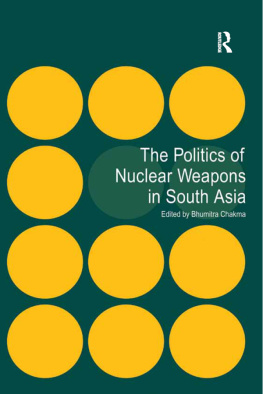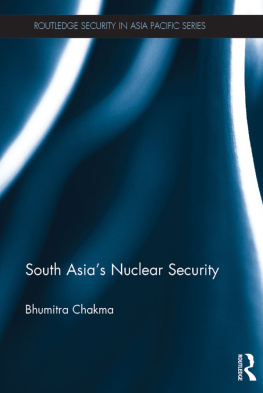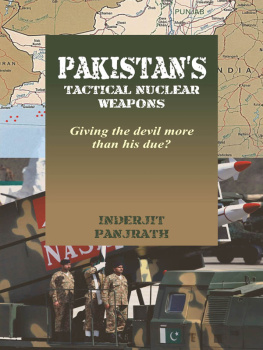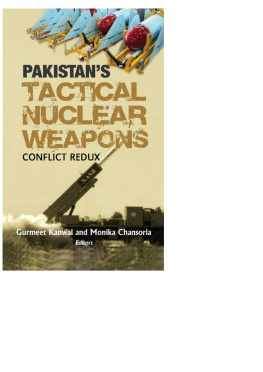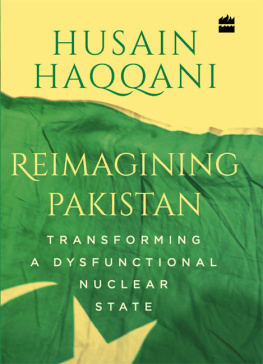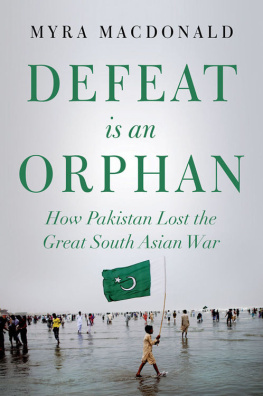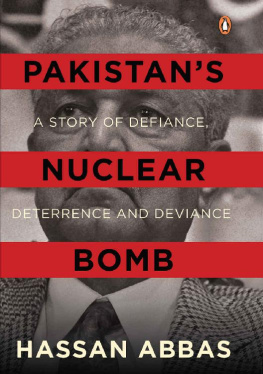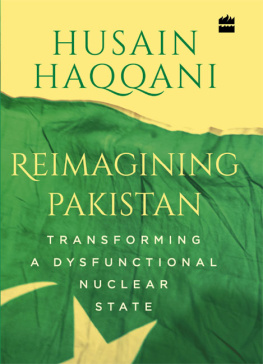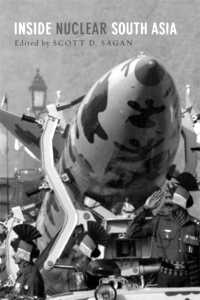Pakistans Nuclear Weapons
Pakistan is a critical country in the structure of contemporary global security. It is a de facto nuclear weapon state, but politically unstable and structurally inherently weak. It is a key player in the global fight against terrorism, but ironically is also a producer of jihadi (religious warrior) terrorists in its Madrassas (religious schools). Structural weaknesses of the state, political volatility, rising religious extremism, and deep-rooted sectarian violence occasionally raise international concerns about the safety of the countrys nuclear assets. The question, therefore, which arises is what type of nuclear power is Pakistan?
This book is a comprehensive study of Pakistans nuclear weapons. It analyses, contextualising the dynamics of the Second Nuclear Age, the countrys nuclear capabilities, management style, evolving nuclear posture, and implications of its nuclear weapons. Indeed, numerous unanswered questions surround the Pakistani nuclear weapons: What is the size of the Pakistani nuclear arsenal? How is Pakistan, as a small and new nuclear power, coping with the challenges and dilemmas of constructing a nuclear posture? Has Pakistan developed a nuclear-use doctrine? How safe and secure are the Pakistani nuclear assets? Has it put in place a robust command and control structure? What are the implications of a nuclear-armed Pakistan for the global non-proliferation regime? Can nuclear technology and materials spread, given the experience of the A. Q. Khan proliferation network, from Pakistani sources? How likely are Pakistani nuclear assets to fall onto the hands of terrorists? And, above all, what is the future of a nuclear Pakistan? This book, organised in eight chapters, addresses these questions.
Bhumitra Chakma lectures in War and Security Studies in the Department of Politics and International Studies at the University of Hull. He specialises in South Asian and global nuclear politics, and ethnicity and nationalism studies. He is the author of Strategic Dynamics and Nuclear Weapons Proliferation in South Asia (2004), and has published widely in international journals, such as Modern Asian Studies, Asian Security, Asian Survey, Identity, Culture and Politics: An Afro-Asian Dialogue, etc.
Routledge Security in Asia Pacific Series
Series Editors
Leszek Buszynski, International University of Japan, and William Tow,
Australian National University
Security issues have become more prominent in the Asia-Pacific region because of the presence of global players, rising great powers, and confident middle powers, which intersect in complicated ways. This series puts forward important new work on key security issues in the region. It embraces the roles of the major actors, their defence policies and postures, and their security interaction over the key issues of the region. It includes coverage of the United States, China, Japan, Russia, the Koreas, as well as the middle powers of the Association of South-East Asian Nations (ASEAN) and South Asia. It also covers issues relating to environmental and economic security, as well as transnational actors and regional groupings.
1 Bush and Asia
Americas Evolving Relations with East Asia
Edited by Mark Beeson
2 Japan, Australia and Asia-Pacific Security
Edited by Brad Williams and Andrew Newman
3 Regional Cooperation and Its Enemies in Northeast Asia
The Impact of Domestic Forces
Edited by Edward Friedman and Sung Chull Kim
4 Energy Security in Asia
Edited by Michael Wesley
5 Australia as an Asia Pacific Regional Power
Friendships in Flux?
Edited by Brendan Taylor
6 Securing Southeast Asia
The Politics of Security Sector Reform
Mark Beeson and Alex J. Bellamy
7 Pakistans Nuclear Weapons
Bhumitra Chakma
Pakistans Nuclear Weapons
Bhumitra Chakma
First published 2009
by Routledge
2 Park Square, Milton Park, Abingdon, Oxon OX14 4RN
Simultaneously published in the USA and Canada
by Routledge
270 Madison Ave, New York, NY 10016
Routledge is an imprint of the Taylor & Francis Group, an informa business
2009 Bhumitra Chakma
Typeset in Times New Roman
by Taylor & Francis Books
Printed and bound in Great Britain by
TJ International Ltd, Padstow, Cornwall
All rights reserved. No part of this book may be reprinted or reproduced or utilised in any form or by any electronic, mechanical, or other means, now known or hereafter invented, including photocopying and recording, or in any information storage or retrieval system, without permission in writing from the publishers.
British Library Cataloguing in Publication Data
A catalogue record for this book is available from the British Library
Library of Congress Cataloging in Publication Data
Chakma, Bhumitra.
Pakistan's nuclear weapons / Bhumitra Chakma.
p. cm. (Routledge security in Asia Pacific series ; 7)
Includes bibliographical references and index.
1. Nuclear weaponsPakistan. 2. PakistanMilitary policy. 3. Nuclear nonproliferationGovernment policyPakistan. I. Title.
U264.5.P18C45 2008
355.02'17095491dc22
2008007861
ISBN 978-0-415-40871-4 (hbk)
ISBN 978-0-203-89223-7 (ebk)
To Professor Leszek Buszynski
Contents
Illustrations
Maps
Figures
Tables
Acknowledgements
I started this study with encouragement from Professor Leszek Buszynski. Without his encouragement, this work perhaps would not have proceeded to this stage. I am greatly indebted to Professor Buszynski for his unfailing support and encouragement.
A number of people and institutions contributed immensely to the completion of this work. I started this work several years ago when I was at the University of Adelaide in Australia. The head of the Politics Unit of the School of History and Politics, Dr Clement Macintyre, greatly facilitated and supported my research on this project. I owe a special debt to Clem.
I received a summer grant from the Faculty of Humanities and Social Sciences, University of Adelaide, to conduct research on a chapter of this book. I also received financial support from the School of History and Politics (University of Adelaide), a small grant from the Faculty of Humanities and Social Sciences, and a travel grant from QANTAS, which facilitated my field research in Pakistan, the United States, and England.
In England and the US, I undertook research in several institutions and interviewed a number of scholars and exchanged views with them, which immensely contributed to my understanding of various strategic issues and to the completion of this work. A special note of gratitude must go to Sir Michael Quinlan who, in the middle of his busy schedule, agreed to share his rich experience on nuclear issues and his deep understanding of South Asian strategic affairs during my research trip to London. He also kindly clarified a number of issues on Pakistans nuclear doctrine via email correspondence. Thanks are due as well to Mr Rahul Roy Chaudri and Sir Hilary Synott of the International Institute for Strategic Studies and Professor Husain Haqqani of Carnegie Endowment for International Peace (Professor Haqqani is a Professor of International Relations at Boston University, and was a visiting fellow at Carnegie at the time of my research trip to Washington, D.C.). I worked at National Security Archive, which is located in Georgetown Universitys library, and I am grateful for having had the opportunity to work there.


